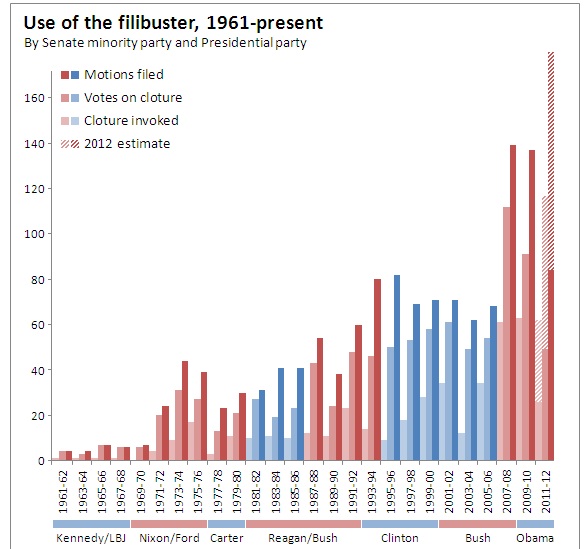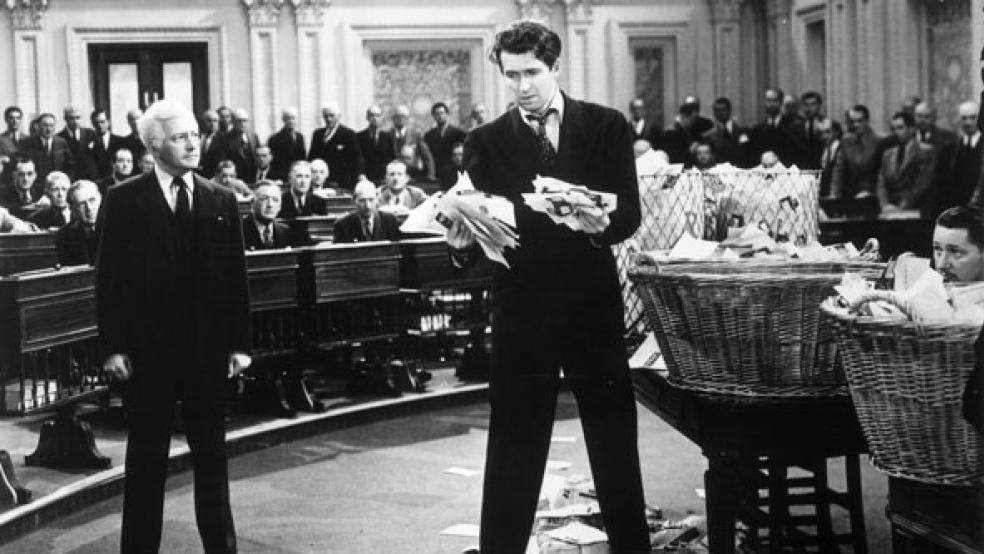One of the things people constantly complain about is the tendency of the media to treat Republicans and Democrats as equally complicit on issues such as the deficit, even if one side actually deserves the bulk of the blame. However, there is one area in which both sides truly are almost equally to blame and that is in abusing the Senate filibuster. This means that the solution will necessarily have to be bipartisan.
Politicians aren’t the only hypocrites favoring the filibuster when it is good for their side and opposing it when it benefits the other. In 1995, when Republicans controlled Congress and there was a Democrat in the White House, The New York Times said the filibuster had to go. It had become “the tool of the sore loser” and “an archaic rule that frustrates democracy and serves no useful purpose.”
Fast forward 10 years to 2005. There is now a Republican president and Democrats in the Senate were using the filibuster liberally to frustrate his agenda. Now, suddenly, the filibuster had become “a time-honored Senate procedure” the Times editorialized. Eliminating the filibuster, as Republicans proposed, threatened the Senate and democracy itself.
Fast forward again to today. Once again there is a Democrat in the White House and Senate Republicans have forgotten all about filibuster reform. Indeed, they have escalated its use beyond any other period in American history, according to Senate data.
Predictably, the Times has forgotten that the filibuster is time-honored and essential to democracy. Expressing sympathy with those who argue that the filibuster is unconstitutional, it now says that the filibuster must be eliminated for judicial and executive nominations, and curbed in other cases.
RELATED: Congress: Throw in the Towel and Declare a Truce
The idea that the filibuster may be unconstitutional is not as radical as it may sound. On Tuesday, the public interest group Common Caused filed a suit in federal court seeking to have the filibuster formally declared unconstitutional.
Legal scholars I have contacted are disinclined to think that the federal district court will even agree to take the case. Not only does the filibuster fall clearly within the political realm in which courts always defer to Congress, it also involves Congress’s own rules, which the Constitution (Article I, sec. 5) permits each house to set for itself.
Lastly, there is a serious question as to whether those bringing the suit have standing and whether the defendants, which include Vice President Joe Biden in his constitutional role as president of the Senate, are appropriately named since they have nothing to do with setting the Senate’s rules.This is not to say that there isn’t a strong case to be made that the filibuster is indeed unconstitutional. Two recent academic articles lay out the argument.
Writing in the May 2011 issue of the Connecticut Law Review, Cornell University law professor Josh Chafetz argues the traditional filibuster, in which a single senator or group of senators engage in “extended debate” by holding the floor continuously, as Jimmy Stewart did in “Mr. Smith Goes to Washington,” is not what is going on today. What we call a filibuster is simply a 60-vote requirement for whatever is being filibustered. (Under Senate rules, it takes 41 votes to invoke cloture and end a filibuster.)

Instead, Chafetz endorses a theory put forward by University of Houston law professor Aaron-Andrew Bruhl in the July 2010 issue of the Iowa Law Review. He argues that the current Senate practice of treating its rules as continuing automatically from one Congress to the next is wrong. Bruhl says the Senate should readopt its rules at the beginning of each Congress (i.e., every 2 years) as the House of Representatives does.
Under standard parliamentary procedure, the adoption of rules cannot be filibustered and requires only a majority vote. Thus, the Senate could adopt new rules limiting the filibuster by majority vote in January, if it chooses. Indeed, Chafetz goes further, arguing that any senator could move to amend the rules at any time.
Contrary to Chafetz, legal scholar Emmet Bondurant, writing in the summer 2011 issue of the Harvard Journal on Legislation, argues that if something is unconstitutional, as he also believes the filibuster is, then the courts not only have the power but the duty to intervene. He puts forward a number of ideas for who might have standing to sue.
Of course, it would be far better if the Senate reformed the filibuster on its own. But it is unlikely to do so unless voters push it. An analysis of polls shows that while opinion is divided, it is moving in the direction of reform. In 2009, a CNN/Opinion Research poll found 56 percent of people favoring the filibuster as it is and only 39 percent opposed. A 2010 CBS News/New York Times poll, however, found only 44 percent of people favoring the filibuster, with 50 percent opposed. The latest poll, by Quinnipiac University in January 2011, found people roughly split, with 45 percent favoring the status quo and 42 percent favoring reform.
ConstituLet'
I have previously argued that if Republicans believe they will retake the White House next year, they would be wise to cut a deal with Democrats on the filibuster now while they are sympathetic to the idea. A year from now, when Senate Democrats are back doing the same thing to Republicans that Republicans are now doing to Democrats, Republicans will regret not acting when both parties think they may benefit from filibuster reform.






